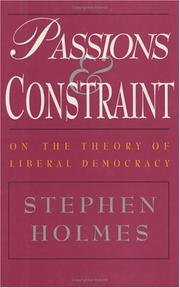Check nearby libraries
Buy this book

In this collection of essays on the core values of liberalism, Stephen Holmes - nationally noted for his scathing reviews of books by liberalism's opponents - challenges commonly held assumptions about liberal theory. By placing it into its original historical context, Passions and Constraint presents an interconnected argument meant to change fundamentally the way we conceive of liberalism.
According to Holmes, three elements of classical liberal theory are commonly used to attack contemporary liberalism as antagonistic to democracy and the welfare state: constitutional constraints on majority rule, the identification of individual freedom with an absence of government involvement, and a strong emphasis on the principle of self-interest.
Through insightful essays on Hobbes's analysis of the English Civil War, Bodin's writings on the strategic benefits of limited government, and Mill's views on science and politics, Holmes convincingly shows that liberalism's basic principles provide, to the contrary, a plausible foundation for the development of democratic, regulatory, and redistributionist politics in the modern era.
Holmes argues that the aspirations of liberal democracy - including individual liberty, the equal dignity of citizens, and a tolerance for diversity - are best understood in relation to two central themes of classical liberal theory: the psychological motivations of individuals and the necessary constraints on individual passions provided by robust institutions. Paradoxically, Holmes argues, such institutional restraints serve to enable, rather than limit or dilute, effective democracy.
In explorations of subjects ranging from self-interest to majoritarianism to "gag rules," Holmes shows that limited government can be more powerful than unlimited government - indeed, that liberalism is one of the most effective philosophies of state building ever contrived. By restricting the arbitrary powers of government officials, Holmes states, a liberal constitution can increase the state's capacity to focus on specific problems and mobilize collective resources for common purposes.
An elegantly written and subtly conceived historical reconstruction of liberalism, Passions and Constraint is a compelling assessment of what that tradition has meant and what it can mean today.
Check nearby libraries
Buy this book

Previews available in: English
Subjects
Liberalism, DemocracyShowing 1 featured edition. View all 1 editions?
| Edition | Availability |
|---|---|
|
1
Passions and constraint: on the theory of liberal democracy
1995, University of Chicago Press
in English
0226349683 9780226349688
|
aaaa
Libraries near you:
WorldCat
|
Book Details
Edition Notes
Includes bibliographical references (p. 275-322) and index.
Classifications
The Physical Object
ID Numbers
Community Reviews (0)
Feedback?| July 17, 2024 | Edited by MARC Bot | import existing book |
| April 28, 2010 | Edited by Open Library Bot | Linked existing covers to the work. |
| February 1, 2010 | Edited by WorkBot | add more information to works |
| December 9, 2009 | Created by WorkBot | add works page |










